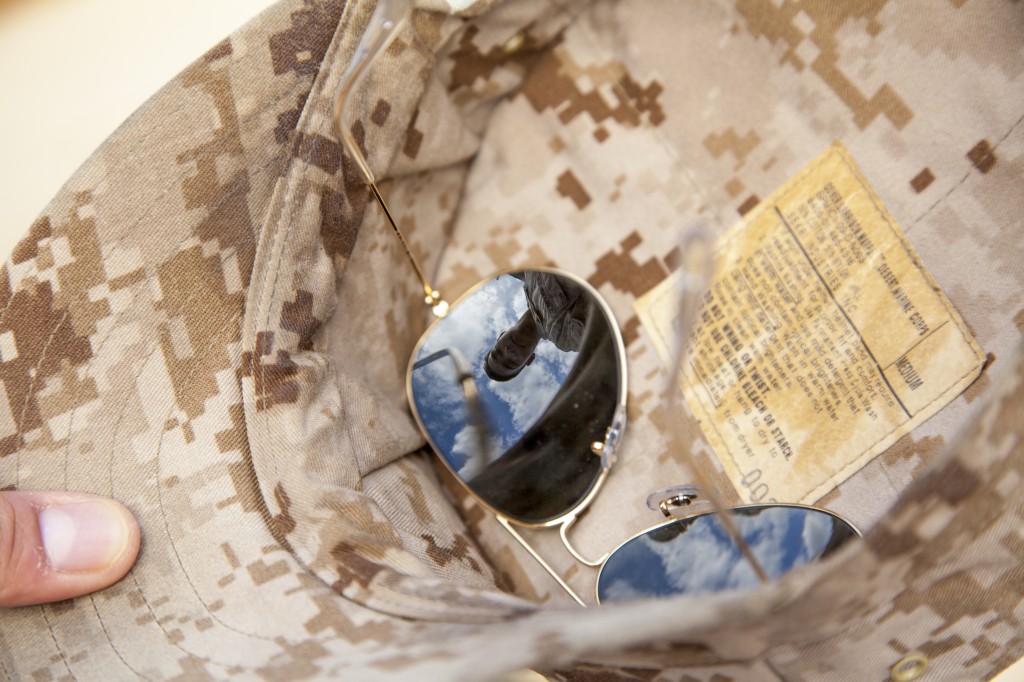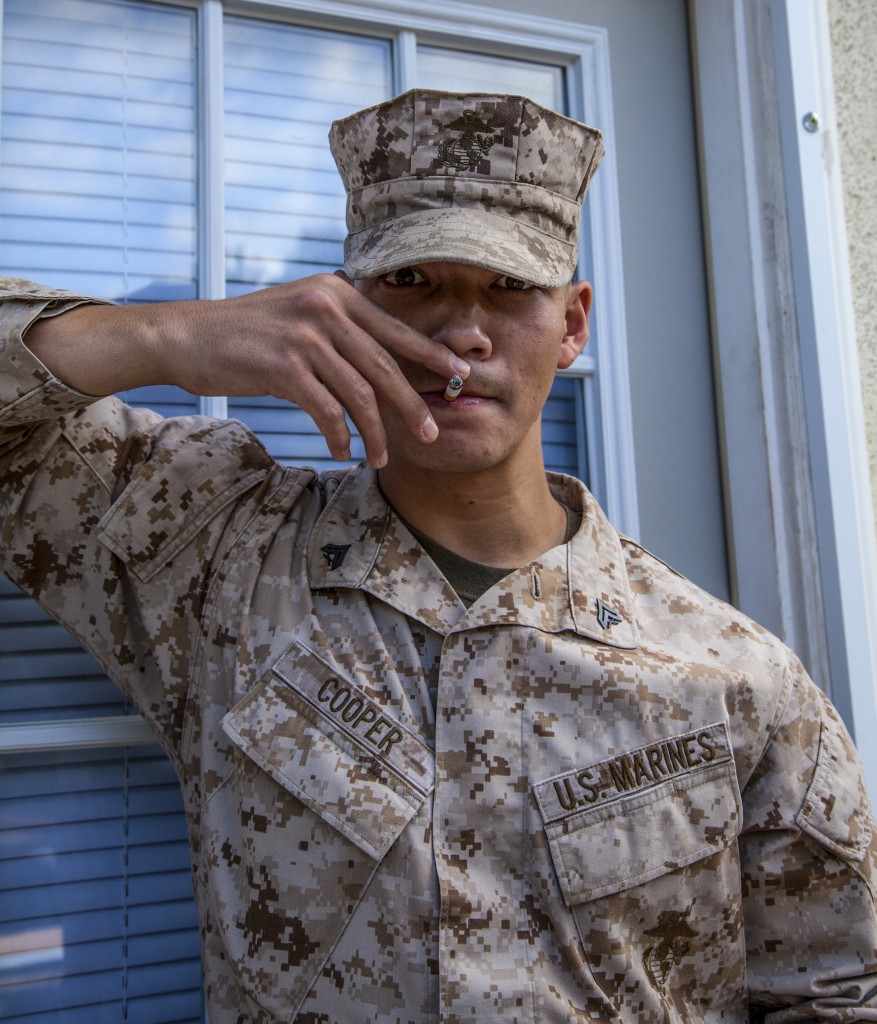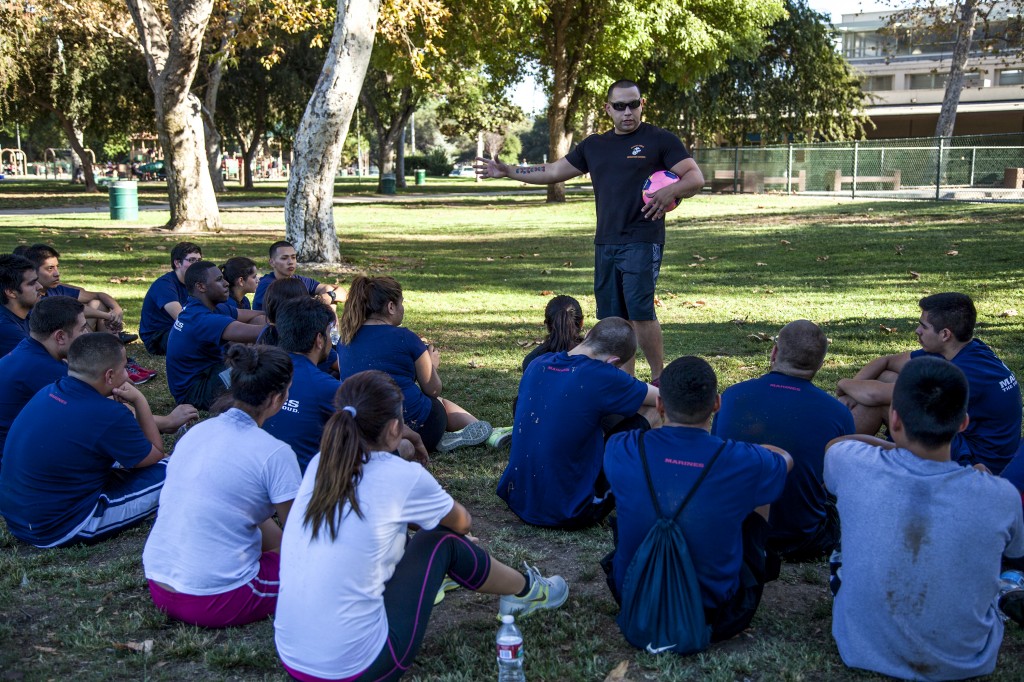Story By: Raymond Chavez Rodriguez Jr.



In the intense hot heat of the summer day, in the football stadium at Los Angeles Valley College, parents are waiting patiently in the bleachers. The sun continues to beat down on them. They are uncomfortable; they seem to be suspended in a shared state of calm anticipation.
The silence is broken as cheers erupt from the crowd. Students follow one another in a straight perfect line as they descend the stairs leading to the commencement platform. As they shout, screaming out their names, the graduates walk on the field for the ceremony.
The ceremony ends. Across the green cut football field, the graduation caps are thrown into the high clear fresh air and come tumbling back down.
After graduation, some high school students go to college, some to work, but there are some, such as Brian Cooper, who choose to serve their country.
Before being accepted into the armed forces, Cooper and other prospective graduates must undergo rigorous training exercises as part of the recruiting process. Training involves exhaustive crunches, push-ups, pull-ups and running a long dirt track field.
While they might end up feeling exhausted and losing their breath, they have to undergo this type of activity for up to two weeks to prove they’re in shape.
When the day comes, recruits go through the final administrative process at the Military Entrance Process Station.
“I didn’t want to go to college at that time; I was feeling patriotic,” said Cooper, 22, who went to the Marines instead of going to college. “I felt indifferent leaving my family and friends.”
The United States Marine Corps allowed Cooper to find out a lot about himself .
“The hardest challenge was the boot camp hikes,” Cooper said.
The West Coast is known for all their hills, including a huge steep one called “The Reaper.” The hill is designed to scare or frighten some recruits.
Cooper did not see action, but he volunteered five times. Cooper said if he had stayed in the force, he would be sargent, but that was not worth it. Also, he said he was never going to receive oversees deployment, which is what he wanted. Cooper left the Marine Corps on Administrative Separation.
When Cooper came home, he was able to reconnect with friends and family whom he didn’t see for three years. Crashing into a class for History 1 at Pierce College, Cooper focuses on school.
On the other side of the recruitment coin is the trained professional, inducting recruits into the world of military service. Sargent Sergio Lopez is 26 years old and is a Marine Corps recruiter. He joined the group at 20 years old.
“Before joining the Marines, I was a typical high school student, and I was very active, but I didn’t really [have] a direction in life,” Lopez said.
Lopez said his life changed by 180 degrees. He didn’t think college was for him, but the Marines helped him succeed in life, and he is still involved recruiting the next generation of Marines.
“To become a Marine,” Lopez said. “You have to take an Arms Service test, which includes math, English, science and physics.”
Recruits are required to take a sports physical, which is an overall check on your body to make sure you’re physically fit to join.
The Initial Strength Test for the males consists of five pull-ups minimum, a one-and-a-half mile run in 12 minutes or less and 55 crunches in less than two minutes. For females, it’s a 23-second flexing arm hang, 14-minute mile run and 45 crunches in less than two minutes.
“Marines do crunches,” Lopez said. “The Army does push-ups.”
Lopez served one year in war and saw that the real world is not a Hollywood movie.
When Lopez fought in Afghanistan in 2010, he helped to secure hostages and fend off counter insurgents. As a first responder, his actions helped secure the safety of individuals. Lopez administered First Aid to rescued prisoners of war and helped his unit evacuate them to a safe location.
Another recruit who wants to have his life straightened out is 22-year-old Gabriel Araujo.
“For me, I was immune to college,” Araujo said over Skype. “I was a messed-up kid. My parents keep kicking me out off the house a lot. If it wasn’t for the Marines I would be dead or locked away.”
Araujo hasn’t been deployed. He checks back into his unit once a month because he is in the reserves.
“Hopefully I get deployed,” Araujo said. “I want the Marines to change my life to be better, to have a family, finish up school, to build myself a house and I don’t want to live on the street. This is why I am signing up for the U.S. Marine Corps.”
The U.S. Marines Corps said that they could help Araujo and others.
According to the U.S. Military’s web “Top three reasons to join the Marines,” those who sign up will have the honor that comes with being part of one of the most vital military institutions in our nation.
Also, they will be able to improve physical fitness, health and nutrition, and live a fuller and healthier life overall, both while a member of the Marines and after as well.
They will become one of the few, the proud.
To some, this may just be a commercial, but to those who live it, they believe that it’s more than just a mere advertising slogan. It’s a way of life.



